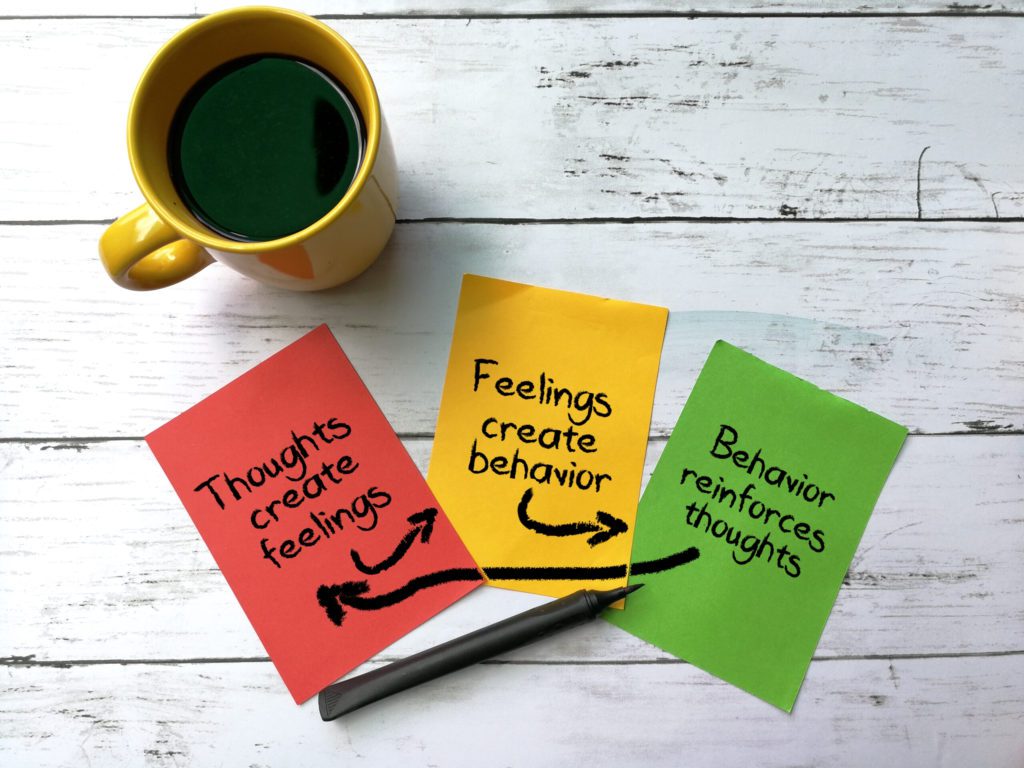Cognitive Behavioral Therapy (CBT) has become one of the leading therapeutic approaches for addiction treatment.
There is abundant research available demonstrating its efficacy in treating a variety of mental health problems, including addiction, anxiety, and depression.
But what is CBT? And how does it work?
Let’s look into why this form of therapy is gaining popularity in treatment centers across the world and why treatment centers are so eager to incorporate it as a key pillar of their rehabilitation program.
What is CBT and How Does It Work
CBT is a highly effective psychological treatment that works on the patient’s thought patterns and the relationship they have with feelings and behaviors.
The therapy is grounded on the principle that the way we think, feel, and act are all closely related and influence our well-being.
Talk therapists will focus on digging into which behaviors are affecting your life negatively and how to “un-learn” them or change them.
CBI therapists may employ a variety of methods to unlearn negative behavior. One example of this is using breathing exercises. By teaching a patient how to control their breathing, therapists may change the way a patient feels, thus changing their behavior.
CBT For Treating Addiction
Substance abuse is also a mental health disorder, the mindset and attitude that addicts have toward addiction have a lot to do with their destructive habits.
While drugs and alcohol do develop physical dependence, the most challenging obstacle in overcoming addiction is psychological.
One does not need to seek too far for proof — take for example an addict who relapses after detox, or who quickly falls into addiction after many years of being sober. In both instances, the addict may have gotten over a physical dependence but not a psychological one, as the addiction remains strong within them.
Cognitive Behavioral Therapy in addiction seeks to resolve the psychological challenges that addicts face by changing their core attitudes and beliefs about substance abuse.
CBT focuses on finding the connections between the addict’s thoughts, feelings, actions, and substance abuse problems. By bringing these connections to the addict’s attention the therapists help them build awareness and control their impulses.
Some ways in which CBT can help addicts with their substance abuse problem include:
- Improving self-control
- Replacing habits that trigger substance abuse
- Recognizing situations where they may be most likely to take drugs or drink alcohol
- Developing coping strategies
- Learning to cope with other behaviors that lead to substance abuse like stress
CBT Techniques for Addictions Treatment & Habit Change
CBT teaches people how to cope with cravings by teaching them how to avoid high-risk situations and manage stress levels.
For example, someone may find themselves drinking each time they feel bored or lonely. In this case, the talk therapist may ask the patient to recognize these behaviors and work on replacing the behavior with something positive instead, like playing a sport or going out with sober friends to places where alcohol is not readily available.
Other CBT techniques that patients may employ in their treatment for addiction include:
- Keeping a diary for self-awareness
- Swapping negative thoughts for positive ones
- Replacing one triggering activity with another
- Breathing exercises
- Scheduling times to relax and enjoy and consciously adding these activities into one’s life
CBT Therapy in Recovery
Alcohol and substance abuse disorders can be treated effectively with cognitive behavioral therapy. A person’s long-term recovery can be supported by the use of this approach on its own or in combination with other approaches.
Now that you have a better understanding of what CBT is, you may want to find a recovery center that offers this form of therapy.
Veritas Detox offers Cognitive Behavioral Therapy as part of its personalized addiction treatment program.
At Veritas we strive to help our patients get sober and stay that way.
Help is available 24 hours a day and 7 days a week at no cost or obligation. Speak to one of Veritas recovery experts, to seek the help you and your loved ones need.
Contact Veritas Detox today!





